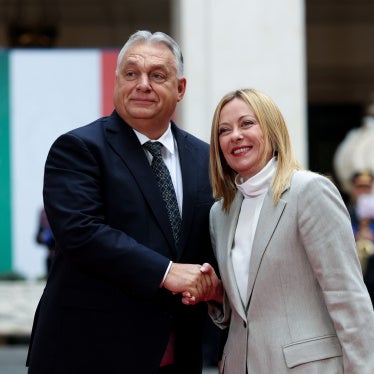Role of the indictees: Slobodan Milosevic and the other four indictees planned, instigated, ordered, committed or otherwise aided and abetted the planning, preparation and execution of the campaign undertaken by forces of Yugoslavia and Serbia in Kosovo between January 1999 and June 20, 1999. (para. 98, amended indictment)
Milosevic's authority: As President of Yugoslavia, Milosevic was Supreme Commander of the Yugoslav Army. (para. 28) Milosevic also exercised extensive de facto control over the Serbian police and other institutions nominally under the jurisdiction of Serbia. (para. 30.) In addition, under the Yugoslav Law on Defense, during a state of war, the Serbian and federal police come under the command of the Yugoslav Army. (para. 29.) A state of war was declared in Yugoslavia on March 24, 1999, which gave Slobodan Milosevic, as supreme commander of the army, both de jure and de facto control of the police.
Specific criminal acts:
Murder: Forces of Yugoslavia and Serbia murdered hundreds of Kosovo Albanians between January 15, 1999 and June 20, 1999. The killings occurred in a widespread or systematic manner. (para. 24.)
[Details are given in para. 24 as to mass killings in Racak, Bela Crkva, Velika Krusa and Mala Krusa /Krushe e Mahde and Krushe e Vogel, Dakovica/Gjakove, Crkolez/Padalishte, Izbica, villages around Vucitrn/Vushtrri, Meja/Meje, Dubrava/Dubrave Prison complex, Suva Reka/Suhareke, and villages in the municipality of Kacanik.]
Deportation: Between January 1, 1999 and continuing until June 20, 1999, Yugoslav and Serbian forces unlawfully deported and forcibly transferred approximately 740,000 Albanians from Kosovo; thousands more became internally displaced. (paras. 23 and 99)
Persecution on political, racial and religious grounds: In addition to the murder and deportation, forces of Yugoslavia and Serbia, acting in concert, engaged in a well-planned and coordinated campaign of destruction of property and personal identity documents belonging to Kosovo Albanian civilians. (paras. 20 and 22) Throughout Kosovo, these forces looted and pillaged the personal and commercial property owned by Kosovo Albanians and forced them from their homes. (para. 19) They also harassed, humiliated, and degraded Kosovo Albanian civilians based on the latter's ethnicity and religion. This took the form of physical and verbal abuse, including insults, racial slurs, degrading acts, beatings, and other forms of physical mistreatment based on ethnicity and religion. (para. 21)
Criminal Charges (para. 26):
Count 1 - crime against humanity (deportation), Art. 5(d) of the Tribunal Statute
Count 2 - crime against humanity (murder), Art 5(a) of the Tribunal Statute
Count 3 - violation of the laws or customs of war (murder), Art. 3 of the Tribunal Statute;
Count 4 - crime against humanity (persecution), Art. 5(h) of the Tribunal Statute
All acts and omissions charged as crimes against humanity were part of a widespread or systematic attack. (para. 54)
Individual and Command Responsibility:
Each of the accused is individually responsible. Individual responsibility includes committing, planning, instigating, ordering or aiding and abetting in the planning, preparation or execution of the crimes. (para. 55)
Milosevic, Milutinovic, Ojdanic and Stojiljkovic also face responsibility for the acts of their subordinates, including members of the Yugoslav Army and employees of the Ministries of Internal Affairs of Yugoslavia and Serbia. (paras. 56-59)
Bosnia and Croatia are not covered by indictment but are mentioned:
Actions similar in nature took place during the wars in Croatia and Bosnia and Herzegovina between 1991 and 1995. During those wars, Serb military, paramilitary and police forces forcibly expelled and deported non-Serbs in Croatia and Bosnia and Herzegovina from areas under Serb control. They utilized the same method of operations as those used in Kosovo in 1999: heavy shelling and armed attacks on villages; widespread killings; destruction of non-Serbian residential areas and cultural and religious sites; and forced transfer and deportation of non-Serbian populations. (para. 95)







